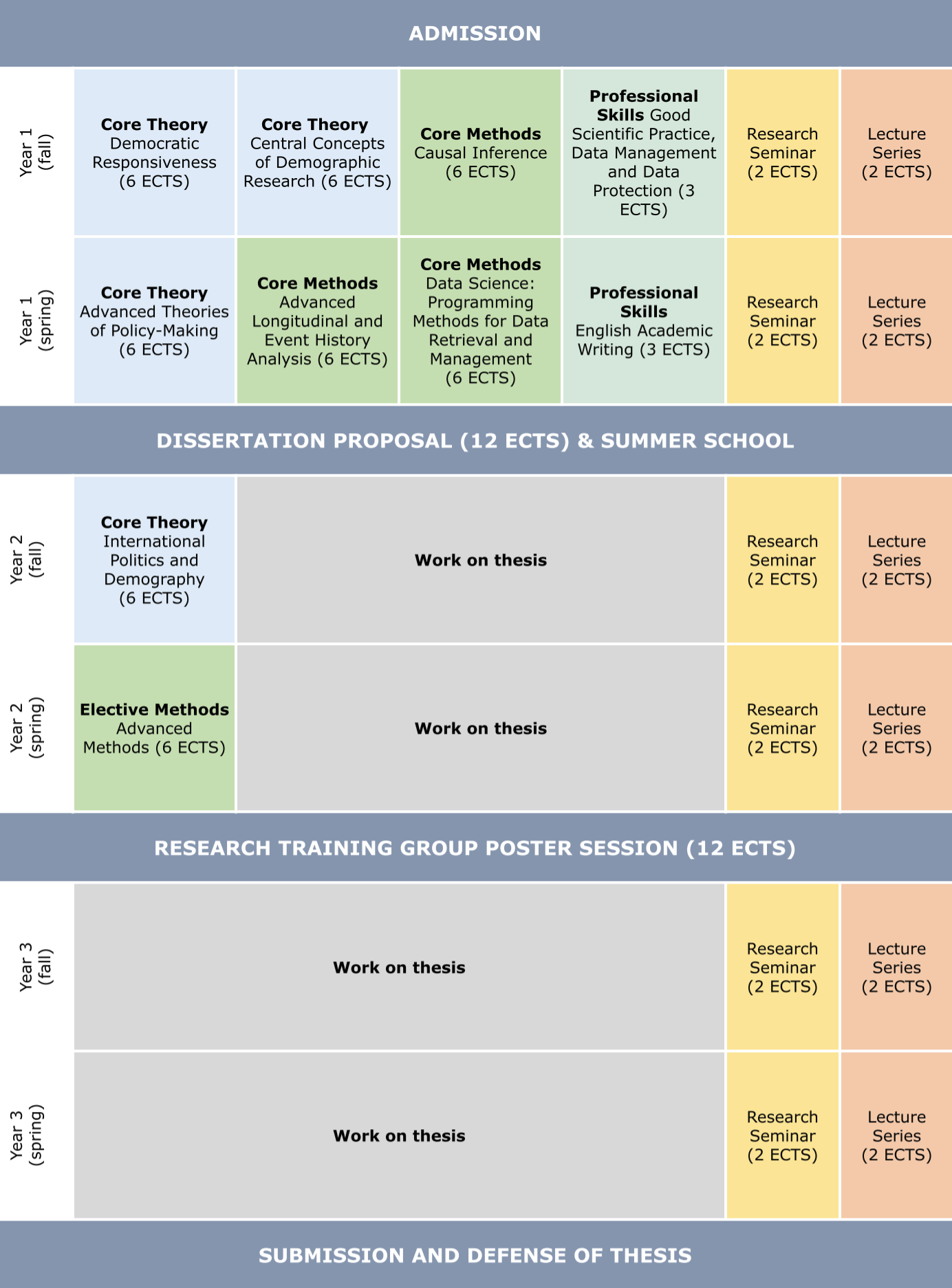PhD Programme
A comprehensive course programme provides the doctoral researchers with a unique combination of
- advanced theoretical courses in Demography, Democratic Processes and Public Policy,
- cutting-edge quantitative methods skills, and
- an interdisciplinary internal research seminar, as well as
- an interdisciplinary international lecture series.
The programme provides PhD students with a unique and internationally competitive curriculum taught and supervised by leading experts from Political Science, Demography and Public Policy. It fosters interdisciplinary exchange to enable PhD students to conduct innovative research that sheds much needed light on how demographic shifts affect and interact with democratic processes and public policy.

The theory course sequence will on the one hand provide our doctoral researchers with a solid understanding of the different concepts and theories in all three research areas through three core theory courses providing the PhD students with a solid understanding of the central concepts and theories in all three fields covered by DYNAMICS (Democratic Responsiveness, Central Concepts in Demographic Research and Advanced Theories of Policy-Making) which will constitute an important basis for interdisciplinary exchange within the RTG. On the other hand, doctoral researchers will obtain specialized theoretical knowledge regarding their own research area through a disciplinary elective theory course to ensure that they are also on a highly advanced theoretical level within their own discipline. Thus, the theory course sequence ensures that all PhD students will have an advanced understanding of the basic concepts and theories of all three research areas, but at the same time they will be enabled to integrate the three perspectives in a disciplinary course to understand how demographic change, democratic processes and public policies interact based on a concrete example in their own research area.
The methods course sequence will provide our doctoral researchers with a highly advanced training in quantitative methods which is essential for cutting-edge research on questions related to demography, democratic processes and public policy. PhD students will be introduced to causal data analysis through the Foundations: Estimation and Identification course while they get an advanced understanding of longitudinal modelling through the Advanced Longitudinal and Event History Methods course. To cope with gathering, managing and analysing increasingly large datasets by for instance scraping information from the web, the doctoral researchers will take a Data Science class in which they learn how to deal with big data using advanced programming skills. In addition, the elective methods course allows PhD students to specialize in quantitative methods that are particularly important for their specific research projects.
Finally, the professional skills course sequence will prepare our doctoral candidates for the academic and the research-related job market. An important component of the course programme is furthermore the Research Seminar in which PhD students will present their on-going work and the Lecture Series in which internationally renowned scholars are invited to foster not only interdisciplinary, but also international exchange. The combination of interdisciplinary and disciplinary theory courses with advanced quantitative methods training as well as a research seminar and an international lecture series offers a unique research environment that will foster truly cross-cutting research on the highest level that will result in important advances in our understanding of how demography shapes democratic processes and public policy as well as how policy reforms affect demographic behaviour.
Workshops and Summer Schools
DYNAMICS will moreover regularly organize workshops with invited external experts to teach additional or more advanced courses in Berlin. The topics will be decided jointly by the Academic Board and the PhD students to ensure that course content suits both, students’ specific interest and profile formation of our institutions. Moreover, our doctoral researchers will receive funding to attend specialized methods or substantive courses at prestigous international summer schools in order to gather further knowledge in their respective research area, to develop their individual international network and to present their work to renowned international scholars. Summer School Courses and Workshops organized in Berlin can be accredited as an Elective Course.
Conferences
Doctoral researchers will be encouraged and financially supported to present their research at high-ranking national and international academic conferences to disseminate their findings to the academic community, to receive valuable feedback on their work and to build an international research network. Presenting a research paper at APSA, ECPR, ECSR, EPC, EPSA or PAA meetings increases success in subsequent publication in highly ranked peer-reviewed journals. Getting accepted to these conferences is not easy. Therefore, each supervisor commits to guide our PhD students in their conference application and to discuss their conference proposal either in a colloquium or individually.
